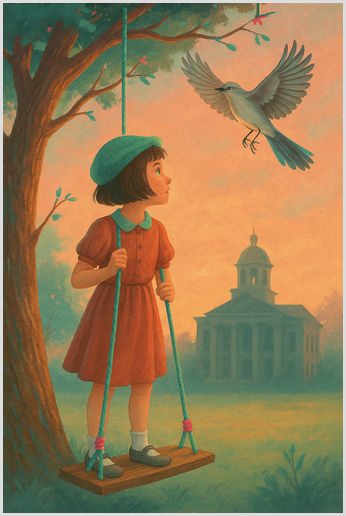To Kill a Mockingbird by Harper Lee was written in 1960. It is a Southern Gothic novel that has been acclaimed and popular since its publication, winning the Pulitzer Prize and becoming a staple of modern American Literature. It is set during the Great Depression in the fictional town of Maycomb, Alabama. The protagonist is the young Scout Finch, who is confronted by prejudice and injustice during her childhood. The work explores deep-rooted social issues, human nature and morality.
Understanding the themes in Harper Lee's To Kill a Mockingbird is crucial for your GCSE English Literature exam. This is particularly important because Harper Lee loosely based the plot and characters in the novel on observations about her family, neighbours. The plot also resembles an event in Lee's hometown of Monroeville when she was a child, when a black man was wrongly accused of raping a white woman.
To Kill a Mockingbird themes that we will explore include prejudice, courage, family values and social inequality. We will provide insights and analysis for each theme, including plot examples and quotes to memorise. If you need help revising for this novel, TeachTutti has experienced GCSE English Literature tutors. Lessons can be in-person or online using the TeachTutti learning platform.
Prejudice
Prejudice is pervasive throughout the novel, particularly racial hatred. Lee shows how it is deeply embedded into southern life within Maycomb's society. Tom Robinson is an innocent black man accused of raping a white woman. There is clear evidence that proves his innocence. However, the ingrained prejudice of the community led to his conviction, and Tom is tragically shot and killed trying to escape from prison. Atticus Finch articulates this injustice when he says:
"In our courts, when it's a white man's word against a black man's, the white man always wins."
Lee also highlights prejudice through characters like Mrs Merriweather, whose hypocrisy reveals the contradictions of the town's morality. She is a Methodist and supports missionary work abroad. However, she dismisses injustice at home and is offended that the black community can't move on after Robinson's trial. This shows her blindness to her shortcomings:
"There's nothing more distracting than a sulky darky."
Scout becomes increasingly aware of this attitude during the novel. She reflects on the attitudes in society when she remarks:
"I think there's just one kind of folks. Folks."
Family life
The importance of upbringing and family values on a person's identity are highlighted by Harper Lee. She explores various family structures in Maycomb and their differences in morality and personal development.
Atticus Finch is the father of the Finch family. He is a compassionate and principled man who defends Tom Robinson as his attorney. He represents a progressive model of parenting for the American South in the 1930s. He encourages empathy, honesty and honesty to Jem and Scout, encouraging them to view the world from others' perspectives:
"You never really understand a person until you consider things from his point of view… until you climb into his skin and walk around in it."
The Ewells family have a chaotic household that is marked by neglect and hostility. The father, Bob Ewell, is hinted to have molested his daughter. This abuse, as well as his prejudiced behaviour, has a direct effect on the development of his children, which leads to a cycle of ignorance and aggression in the community.
Looking beyond the parents, Scout and Jem have a close bond as siblings. They occasionally disagree, yet Jem plays a protective role in Scout's life, supporting her during challenging times. This is highlighted at the end of the novel, when it is unclear if Jem or Boo Radley killed Bob Ewell with a knife when he attacked Jem and Scout on their way home from a school pageant:
"Jem was becoming almost as good as Atticus at making you feel right when things went wrong."
Courage
Courage is presented in various ways during To Kill a Mockingbird. Harper Lee challenges the traditional view of bravery, suggesting that true courage lies in standing by your convictions, even in the face of personal risk. This is the case when Atticus Finch decides to defend Tom Robinson. He knows he will be criticised and ostracised by society, which he explains to Jem:
"I wanted you to see what real courage is… It's when you know you're licked before you begin, but you begin anyway and see it through no matter what."
Mrs. Dubose struggles with morphine addiction. She is determined to break her addiction and manages to stop taking the drug in her last few months of life. Her struggle shows that bravery also lies in personal battles and inner strength. Atticus explains this to Jem, who initially misunderstood her harsh nature:
"She was the bravest person I ever knew."
Scout and Jem confront their fears about Boo Radley during the novel. He is a neighbour and a recluse. The local community talk fearfully of him, almost as a monster. However, he leaves them small gifts in a tree outside his home and shows affection to them from a distance. They learn empathy and understanding from these interactions, as well as the importance of overcoming personal misconceptions and facing fears.
Coming of age
The theme of coming of age is central to Lee's novel. Jem is 10 years old and Scout is 6 years old. Their journey from childhood innocence to learning about human nature and the complexities of society is explored by Harper Lee.
Scout at first simplistically sees the world. She learns about the prejudices and injustices in her local community during the plot, especially the trial of Tom Robinson. She remains innocent, but she becomes mature and more aware as events unfold. The book is narrated by Scout, and she acknowledges this change:
"I was born good but had grown progressively worse every year."
Jem is deeply shaken by the unfair verdict of the trial. There is clear evidence that Robinson is innocent, and his conviction affects Jem's belief in fairness. He moves from childhood idealism to a more nuanced, realistic perspective of the world. He expresses this when he is dismayed about the verdict:
"It ain’t right, Atticus… How could they do it, how could they?"
Their coming-of-age experiences stress the importance of empathy and moral insight, which Atticus has instilled in them. This growth is shown through the attitude towards Boo Radley, moving from fear and curiosity to compassion and understanding.
Social inequality
Social inequality is evident at every level of Maycomb society. The rigid class distinctions and social structure have a significant effect on the lives of people in the community, affecting their interactions and opportunities.
Family background and social standing indicate the worth of a person in the Maycomb community. The Ewells have low morals and are referred to as "white trash" by the townspeople. However, they are favoured in society over members of the black community due to their race. Scout summarises the social structure succinctly:
"There's four kinds of folks in the world. There's the ordinary kind like us and the neighbors, there's the kind like the Cunninghams... the kind like the Ewells... and the Negroes."
There is clear evidence of Tom Robinson's innocence during his trial. However, he is an African-American in the American South during the 1930s. His voice counts for little, and societal prejudice is shown to be the determining factor in dispensing justice. Atticus observes this:
"In our courts, all men are created equal... [but] a court is only as sound as its jury."
Walter Cunningham is a poorer classmate of Scout. Despite his financial situation, with no food and arriving at school on his first day without shoes, Walter is clean and dignified. This contrasts sharply with the Ewells' entitlement.
Conclusion - Themes in To Kill a Mockingbird
The central themes in To Kill a Mockingbird provide insight into human nature and society. The author Harper Lee explores prejudice, courage, family life, coming of age, and social inequality. Despite being written in 1960 and set in the 1930s, its messages remain relevant to the modern world. The reader is encouraged to challenge injustice, empathise and develop a sense of integrity and compassion.
For further reading, SaveMyExams has written an article explaining the historical context for To Kill a Mockingbird. You can also memorise key quotes in the novel by SparkNotes.
If you need help revising this novel, TeachTutti have English Literature GCSE tutors who can support your revision. Every tutor has a DBS check, and they will tailor lessons to your specific needs, such as preparing revision notes.
This post was updated on 10 Jul, 2025.

